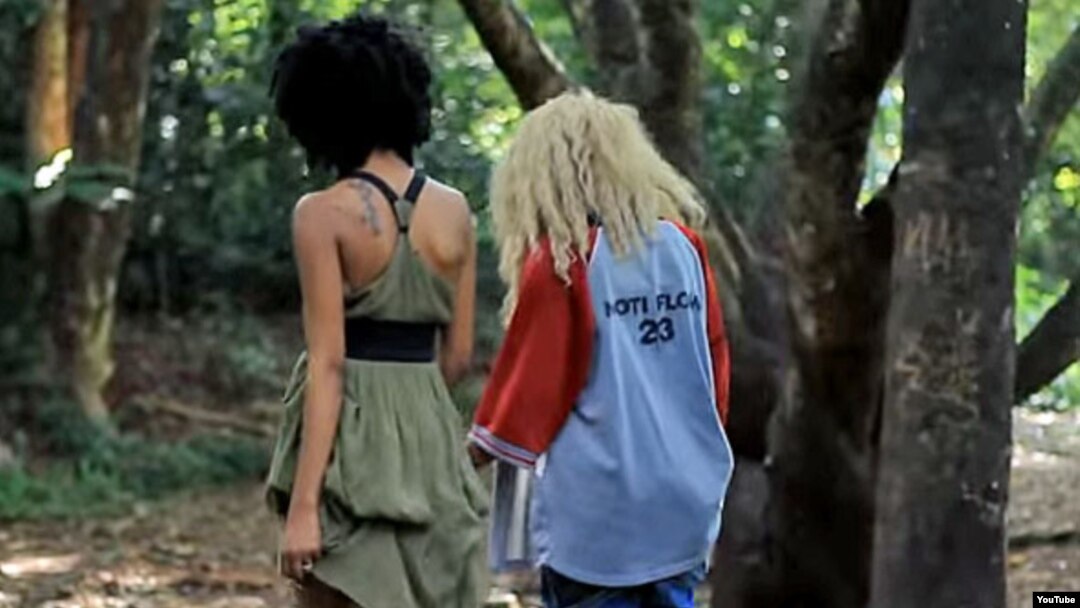Kenyan state regulators have banned a locally produced song and accompanying music video that call for equal treatment of LGBT individuals, something regulators say violates Kenya’s anti-homosexuality law.
The song is a remix of the American single “Same Love,” released in 2012 by Macklemore and Ryan Lewis at the height of the same-sex marriage debate in the United States.
Kenyan recording artists Art Attack and Nicole Florence Kutoto released the video for their “Same Love Remix” on YouTube on February 15. There is no mistaking the video’s message.
“This song goes out to the new slaves, the new blacks, new Jews, the new minorities for whom we need a civil rights movement, maybe a sex rights movement especially in Africa, everywhere. This goes out to you. I feel you,” says Kenyan rapper and producer Art Attack at the start of the video.
The content of the video is perceived as nothing short of scandalous in Kenya. It features two love stories: one between two men and another between two women. The couples hold hands and kiss. There are brief bedroom shots and scenes of daily life, like the two women cooking together in the kitchen.
One of the men commits suicide at the end, leaving a note that reads “Tired of the pain, tired of the stigmatization…Wish I wasn’t born this way.”
‘Society would judge them’
“We decided to do it because these people exist, they have associations, they get married but they are afraid to come out because the society would judge them and condemn them and everything,” says Kutoto, who sings the hook for the song. “Everybody has to have the freedom to do whatever they want to do, marry whoever they want to marry. So we were just trying to raise their voice, create their awareness in Africa.”
Homosexual acts are illegal in Kenya, punishable by as much as 21 years in prison. There have been mob attacks against LGBT individuals in Kenya in recent years, according to activists.
The actors featured in the video are in hiding. Kutoto says she has received threats via social media.
One month after it was posted, the video has nearly 200,000 views on YouTube. There are over 1,000 comments, a mix of support and condemnation.
“Very provocative. I like that the conversation is started,” writes one person.
“+Art Attack, you are sick, you need pills,” writes another user.
“I'm straight, I don't brag or publicize it,” writes someone else. “Why do you have to go extra miles to try and publicize yourselves? Furthermore do you guys read the Bible? There are things that God hates.”
‘Against our culture’
The Kenya Film and Classification Board (KFCB) says it has written to YouTube asking them to take the video down.
“Because it promotes homosexuality and homosexuality is illegal in Kenya,” said KFCB CEO Ezekiel Mutua. “[It] is therefore against the law, it promotes concepts and ideologies that are against our culture and the law.”
Mutua insisted the ban is not an attack on civil rights.
A local talk show, "The Trend," debated the ban of “Same Love Remix” on February 26. The conversation focused on the question of whether the KFCB should be the “moral police” of the nation.
The KFCB rates all film content produced and broadcast in Kenya in order to “maintain public order” and “uphold national values.” Fifty Shades of Grey and The Wolf of Wall Street are among recent movies banned by the KFCB.
For now, “Same Love Remix” is only viewable online in Kenya via YouTube.
Google, YouTube’s parent company, declined to comment on the KFCB’s request to pull the video down. By Western standards, the video would not appear to violate YouTube’s posted policy and safety guidelines. That policy lists procedures for flagging inappropriate content for possible removal for reasons such as hate speech, child endangerment and sexually explicit content.
Restrictions – ‘exercise in futility’
The debate over the “Same Love” remix is a harbinger of fresh challenges to come for African governments accustomed to a certain level of control over traditional broadcast media. In this new information age, African governments have to contend with vehicles for information and communication that are not based in their countries.
Trying to control that flow of information is "an exercise in futility," said Henry Maina, Executive Director of the East Africa office of Article 19, a global free speech advocacy group.
“Most governments are in denial that these tools are available and might not be restricted and are wasting too much resources trying to unduly restrict [them],” he said.
Rights groups petitioned the African Union and the United Nations last month when Uganda blocked access to Facebook, Twitter and other internet platforms during and after the February 18 presidential elections.
However local media reported widespread downloads of VPN software in Uganda during that period, effectively allowing people to bypass the ban. Ruling party officials in Uganda were among those tweeting, though Twitter had been blocked.
Lizabeth Paulat contributed to this report from Kampala, Uganda.


